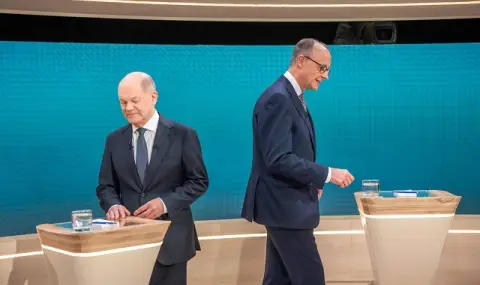Germany enters the final phase of the election campaign for the parliamentary elections on Sunday in an environment that is more polarized than ever on immigration and further heated by the Trump administration's open support for the far right.
This tense atmosphere - unusual for a country long accustomed to the polite exchange of opinions between parties and nurtured by a culture of compromise - was illustrated by the unprecedented election debate last night on RTE television.
This was not a usual duel, as in previous elections, but one that brought together the four main contenders for the chancellorship for the first time in the history of German television, which is indicative of the unprecedented extent to which political fragmentation.
For two hours, the current Social Democratic Chancellor Olaf Scholz, the leader of the conservatives Friedrich Merz, the leader of the Green Party Robert Habeck and the leader of the far-right party “Alternative for Germany“ (AfD) Alice Weidel participated in an uncompromising television competition.
Rise of the far right
The AfD has won a place in this “four“ thanks to polls that predict that the nationalist anti-immigrant party will come in second place in the parliamentary elections, with at least 20 percent of the vote, while the conservatives are counting on between 30 and 32 percent support.
The undisguised support it receives from US President Donald Trump's entourage has added an additional touch of tension in the final days of the campaign.
“I refuse to accept such interference in the German parliamentary elections and in the formation of the new government“ of Germany, said Friedrich Merz, the favorite in the polls to be the next chancellor, during the debate.
This is about the speech that caused violent reactions, given on Friday by US Vice President J.D. Vance to participants in the Munich Security Conference.
In it, he called on traditional German parties, and in particular the classical right, to abandon the so-called firewall against the far right. This policy of building a cordon sanitaire against far-right formations has been established in the political life of the Federal Republic since World War II, and its goal is to isolate and prevent such parties from participating in government.
“There is no room for firewalls“, said Vance.
“I will not let an American vice president tell me who to talk to here in Germany“, countered Merz.
Chancellor Olaf Scholz described the intervention of Trump's deputy as “unacceptable“, while the AfD greatly admired it.
Alice Weidel “warmly welcomed“ the “clear words“ J.D. Vance and highlighted the similarities between his party's platform and that of the Trump administration.
This is particularly true of immigration, a topic that has been heating up the German election campaign and which the AfD has capitalized on with its platform advocating "remigration."
The Munich Attack
The AfD has gained popularity after a series of recent fatal attacks by foreigners in the country, such as the car attack in Munich on Friday that killed two people and injured 37. These actions provoked a strong public reaction.
Alice Weidel accused Olaf Scholz's government of "people dying in the streets every day."
Friedrich Merz, in turn, promised to review asylum policy.
The parties of these two leaders recently began a much-criticized rapprochement in parliament on this issue.
According to an RTE poll conducted immediately after the debate, 32 percent of viewers thought that Friedrich Merz was the most convincing, ahead of Olaf Scholz with 25 percent and Alice Weidel with 18 percent. However, the current chancellor failed to "turn the tables" on his opponent, Merz, as he had hoped.
It is therefore unlikely that the debate will have fundamentally changed the current trend in opinion polls, which show the conservatives as the favorites to return to power, while the Social Democrats are garnering 15 percent support.
The far right, on the other hand, could enjoy a record result that could significantly complicate the formation of a stable governing coalition after the elections.
Translated from French: Alexei Margoevsky, BTA
